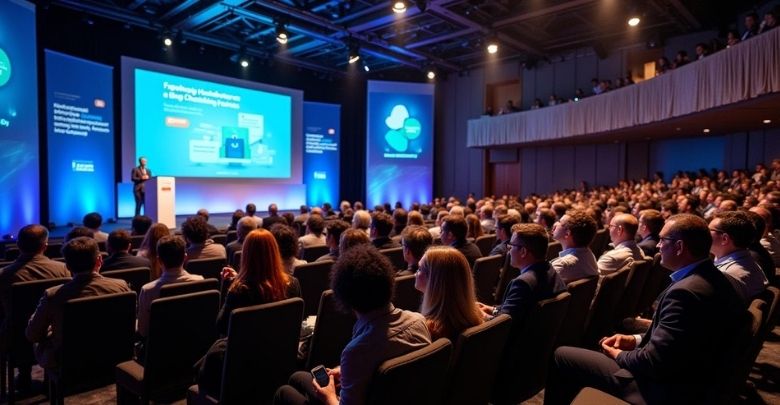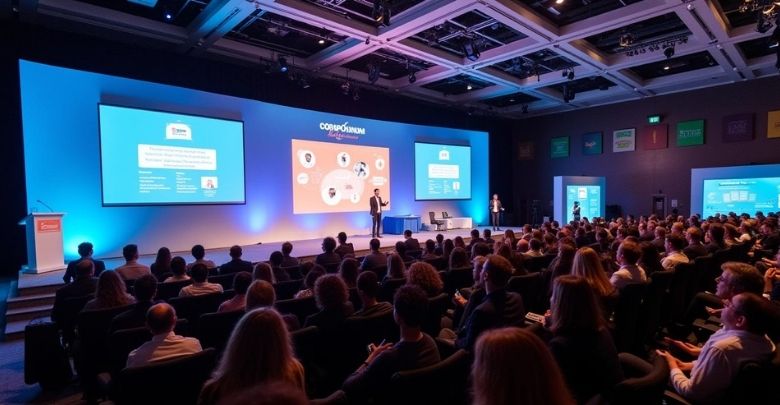Are you interested in staying updated on the latest advancements in applied sciences? Canada hosts some of the most influential conferences that bring together researchers, industry experts, and academics to address real-world challenges through scientific innovation. Exploring the top 10 applied sciences conferences in Canada is a great way to discover events that encourage collaboration and knowledge exchange across various scientific fields.
Some of the standout events include the 32nd Global Conference on Biotechnology, Bioengineering, and Biomedical Engineering, the World Conference on Applied Science, Engineering and Technology, and the 17th Canadian Science Policy Conference. If you’re looking to stay current, expand your network, or present your research, these applied science conferences in Canada are where big ideas meet real-world applications.
Whether you’re a researcher, industry professional, or academic, attending any of the top 10 applied sciences conferences in Canada can help you stay competitive and informed. Make sure to mark your calendar, register early, and take full advantage of these influential conferences to contribute to the progress of applied sciences.
Top 10 Applied Sciences Conferences in Canada to Attend
| Date | Conference Name | Venue |
| October 03 -05, 2025 | 32nd Global Conference on Biotechnology, Bioengineering, and Biomedical Engineering (GCBBBE) | Calgary, Canada |
| October 30, 2025 | International Conference on Molecular Biotechnology and Life Sciences | Montreal, Canada |
| October 29, 2025 | Human/Nature: A Conference on Climate Change Adaptation in Design 2025 | Toronto, Canada |
| October 03 -05, 2025 | 31st Global Conference on Electrical and Mechanical Engineering (GCEME) | Calgary, Canada |
| October 14-16, 2025 | 2nd IEOM World Congress on Industrial Engineering and Operations Management | Ontario, Canada |
| Novembar 19-21, 2025 | 17th Canadian Science Policy Conference | Ottawa, Canada |
| November 07- 09, 2025 | 35th Global Conference on Oil, Gas, and Petroleum Engineering (GCOGPE) | Toronto, Canada |
| Novembar 26, 2025 | World Conference on Applied Science, Engineering and Technology | Toronto, Canada |
| November 28 – 30, 2025 | 34th Global Conference on Civil and Architectural Engineering (GCCAE) | Vancouver, Canada |
| Decembar 18, 2025 | International Conference on Bioscience, Biotechnology, and Biochemistry (ICBBB) | Vancouver, Canada |
1. 32nd Global Conference on Biotechnology, Bioengineering, and Biomedical Engineering
Among the most anticipated applied sciences conferences in Canada, this event in Calgary from October 3–5 brings together innovators in bioengineering, medical technology, and sustainable healthcare. It’s a space where engineers, researchers, and medical professionals share research, develop solutions, and explore how science is shaping the future of health systems and biomedical tools.
2. International Conference on Molecular Biotechnology and Life Sciences
Experts in molecular biology and life sciences gather in Montreal on October 30 to explore breakthroughs in biotechnology. Topics include genome editing, microbial systems, and emerging research with real-world potential. The conference offers a focused environment where researchers can present findings, exchange techniques, and connect with peers from labs and institutions worldwide.
3. Human/Nature: A Conference on Climate Change Adaptation in Design
Design professionals and environmental engineers join forces in Toronto on October 29 to reimagine built environments in a changing climate. Discussions center around climate-responsive design, urban planning, and sustainable materials. It’s a creative, science-backed event where innovation and environmental responsibility go hand in hand, especially for professionals blending design and applied science.
4. 31st Global Conference on Electrical and Mechanical Engineering
From October 3–5, this Calgary-based conference brings electrical and mechanical engineers together to exchange ideas on automation, robotics, energy systems, and structural innovation. It’s ideal for professionals exploring the latest applications of engineering in real-world infrastructure and machinery. Expect solution-oriented sessions and exposure to pioneering tools and systems.
5. 2nd IEOM World Congress on Industrial Engineering and Operations Management
Ontario will host this high-energy gathering from October 14–16, where industrial engineers and operations experts explore smart manufacturing, lean processes, and production optimization. Presentations highlight efficiency in supply chains, digital twins, and system-wide innovation. For those shaping the future of operations and logistics, this congress delivers both depth and practical relevance.
6. 17th Canadian Science Policy Conference
In Ottawa from November 19–21, policy influencers, researchers, and science leaders come together to bridge the gap between science and decision-making. Discussions revolve around national research priorities, ethics in innovation, and the societal impacts of science. It’s a unique event where applied science meets governance, public need, and global strategy.
7. 35th Global Conference on Oil, Gas, and Petroleum Engineering
Energy sector experts convene in Toronto from November 7–9 to explore sustainable extraction methods, cleaner production processes, and cutting-edge energy technologies. The event features collaborative dialogue among engineers, researchers, and energy executives working to reduce environmental impact while boosting efficiency and innovation in oil and gas operations worldwide.
8. World Conference on Applied Science, Engineering and Technology
On November 26, Toronto becomes a hub for applied researchers from various fields, including AI, green engineering, and infrastructure. This conference offers a multidisciplinary space for sharing results, methods, and challenges in translating research into usable tech. It’s ideal for professionals looking to apply science to solve today’s real-world problems.
9. 34th Global Conference on Civil and Architectural Engineering
Vancouver welcomes engineers and architects from November 28–30 for a deep dive into sustainable city planning, resilient construction, and modern infrastructure. Discussions range from smart materials to modular design strategies. Attendees walk away with forward-thinking perspectives on civil engineering and its impact on evolving urban environments and global sustainability.
10. International Conference on Bioscience, Biotechnology, and Biochemistry
On December 18, Vancouver hosts bioscience professionals for a full day of exchange around agricultural tech, biopharmaceuticals, and advanced biochemistry. It’s a collaborative event for scientists and academics passionate about the biological sciences and how these discoveries are being applied to solve urgent problems in food, health, and the environment.
Key Topics Will Be Focused on Applied Sciences Conferences in Canada 2025
Applied sciences conferences in Canada offer a platform for researchers and industry professionals to explore practical solutions to contemporary challenges. These events highlight diverse scientific disciplines, promoting interdisciplinary collaboration and advancing research in various fields. Below are key focus areas commonly addressed at these conferences.
Biotechnology and Biomedical Engineering
This field focuses on the development of medical devices, diagnostics, and biopharmaceuticals. Discussions often cover innovations in tissue engineering, regenerative medicine, and biotechnology applications aimed at improving healthcare outcomes and addressing public health issues through scientific research.
Environmental Sciences and Sustainability
Environmental research emphasizes pollution control, renewable energy, and sustainable practices. Conferences explore waste management, water treatment technologies, and climate change mitigation, encouraging solutions that reduce environmental impact and support ecological balance.
Mechanical and Electrical Engineering
Applied research in this field covers advancements in energy systems, robotics, and automation. Participants discuss ways to improve mechanical design, energy efficiency, and power generation systems, focusing on the integration of smart technologies into industrial processes.
Oil, Gas, and Petroleum Engineering
This area addresses energy extraction, resource management, and operational efficiency. Topics include sustainable drilling technologies, energy transition strategies, and environmental risk management within the oil and gas industry.
Civil and Architectural Engineering
Conferences in this field explore sustainable construction methods, resilient infrastructure, and innovative architectural designs. Discussions often revolve around the use of smart materials, urban planning, and green building practices for future-ready cities.
Information Technology and Computer Science
This sector covers developments in data analytics, cybersecurity, and cloud computing. Events often examine how emerging technologies can improve system performance, data security, and software development to meet industry demands.
Aerospace and Space Technologies
Aerospace research focuses on satellite systems, propulsion technologies, and exploration missions. Conferences provide insights into Canada’s contributions to space exploration and the growing role of private and public partnerships in advancing aerospace engineering.
Material Science and Nanotechnology
Research in materials science addresses the creation and application of advanced materials for industrial use. Topics include nanomaterials, composites, and smart materials designed to enhance product durability, sustainability, and efficiency across industries.
Agricultural and Food Sciences
This field covers sustainable agriculture, food security, and biotechnology in food production. Topics often include precision farming, soil health management, and innovations in food processing aimed at improving global food supply chains.
Energy and Power Systems
Energy research focuses on renewable energy technologies, smart grids, and energy storage systems. Conferences discuss advancements in solar, wind, and hydroelectric power, along with strategies for integrating sustainable energy solutions into national energy infrastructures.
Professionals Who Should Attend Applied Science Conferences
Applied science conferences offer professionals from diverse sectors the opportunity to interact with new research and practical solutions. These events create valuable opportunities for networking, knowledge sharing, and building collaborations. Below are the key professional groups that actively participate in applied science conferences.
Academic Researchers
Academic researchers attend applied science conferences to present their latest findings and engage with global experts. They participate in panel discussions, workshops, and presentations to validate theories and discover real-world applications. Their involvement strengthens research collaboration and promotes interdisciplinary innovation.
Industry Engineers
Driving innovation within various sectors, industry engineers join these conferences to explore new technologies and practical solutions for system improvements. They focus on learning about advanced materials, manufacturing techniques, and sustainable engineering practices that can be directly implemented to optimize industrial operations and product development.
Scientists and Innovators
Scientists and innovators participate in exchanging ideas on experimental methodologies and emerging technologies. They contribute to discussions on solving industrial and societal challenges, collaborating with peers to refine scientific processes and bring meaningful solutions to market.
Policy Makers and Regulators
To develop the framework for scientific advancement, policymakers and regulators must stay informed about technological developments and research outcomes. They engage with researchers and industry leaders to ensure that policies and regulations support sustainable growth, public safety, and ethical standards in applied scientific practices.
Entrepreneurs and Startups
Entrepreneurs and startup founders who are exploring opportunities for innovation join these events to connect with researchers, investors, and industry experts. They seek practical insights and strategic partnerships to commercialize scientific discoveries and develop scalable products that meet current market demands.
Corporate Executives and Business Leaders
Aligning business strategies with technological progress, corporate executives and business leaders participate in identifying innovations that can accelerate growth and efficiency. They explore potential collaborations, assess emerging trends, and invest in technologies that can increase operational performance and market competitiveness.
Environmental and Sustainability Experts
Addressing pressing environmental concerns, sustainability experts engage in discussions on eco-friendly technologies and resource management strategies. They collaborate with scientists and engineers to develop solutions that promote sustainable industrial practices, environmental conservation, and compliance with global sustainability goals.
Healthcare and Medical Professionals
To improve patient care and healthcare systems, medical professionals—including doctors, healthcare administrators, and biomedical experts—attend to learn about advancements in medical devices, diagnostics, and treatment methods. Their involvement supports the adoption of innovative technologies that improve healthcare delivery and patient outcomes.
Data Scientists and IT Professionals
Enhancing scientific research with advanced analytics, data scientists and IT professionals participate to explore how data-driven solutions can solve complex industrial challenges. They collaborate with researchers on integrating artificial intelligence, machine learning, and data modeling to optimize processes and propel scientific discovery.
Educators and Trainers
Updating educational content and teaching methods, educators and professional trainers attend to stay informed about emerging scientific trends. Their engagement ensures that academic programs remain relevant and aligned with industry needs, equipping students with the skills required for evolving scientific and technological fields.
How Applied Sciences Are Driving Innovation Across Industries?
Applied sciences contribute practical solutions to actual challenges by combining scientific research with industry needs. This integration enables advancements across various sectors, resulting in improved efficiency, sustainability, and technological progress. Below are some ways applied sciences are shaping industries and influencing modern development.
Advancing Sustainable Agriculture
Applied sciences have improved farming through precision agriculture, enabling optimized use of water, fertilizers, and pesticides. Technologies like soil sensors and automated irrigation systems help farmers increase crop yields while minimizing environmental harm. This scientific approach promotes sustainable food production to meet growing global demands.
Enhancing Renewable Energy Solutions
Innovations in material science and engineering have led to more efficient solar panels, wind turbines, and energy storage systems. Applied research focuses on making renewable energy technologies more affordable and reliable, supporting the global shift toward sustainable energy sources.
Improving Healthcare Technology
Biomedical engineering and applied sciences contribute to developing medical devices, diagnostic tools, and treatment methods. Advances such as wearable health monitors, minimally invasive surgical instruments, and 3D-printed prosthetics improve patient outcomes and expand access to healthcare.
Strengthening Infrastructure Resilience
Civil engineering research has introduced stronger, more durable construction materials and smarter infrastructure designs. Innovations like self-healing concrete and earthquake-resistant structures help cities withstand natural disasters and adapt to climate change challenges.
Optimizing Manufacturing Processes
Applied sciences in industrial engineering streamline production lines through automation, robotics, and data analysis. These improvements reduce manufacturing costs, enhance product quality, and increase workplace safety by minimizing human error and hazardous tasks.
Advancing Environmental Protection
Environmental sciences develop practical methods for waste management, pollution reduction, and ecosystem conservation. Research into biodegradable materials and efficient recycling processes helps industries lower their ecological footprint and comply with environmental regulations.
Improving Transportation Systems
Mechanical and electrical engineering innovations have led to safer and more energy-efficient transportation. Developments in electric vehicle technology, high-speed rail systems, and smart traffic management contribute to more sustainable and efficient transit networks.
Enhancing Cybersecurity Measures
Applied computer science strengthens cybersecurity frameworks through advanced encryption methods, threat detection algorithms, and secure data storage solutions. These measures help protect sensitive information across industries, from finance to healthcare.
Advancing Water Resource Management
Engineering solutions like smart water grids and desalination technologies improve water accessibility and quality. These innovations address water scarcity by enhancing resource distribution, reducing waste, and ensuring safer water supply systems in urban and rural areas.
Supporting Space Exploration
Applied physics and engineering enable advancements in satellite technology, spacecraft design, and planetary exploration. These developments not only expand scientific understanding but also support industries such as telecommunications, navigation, and Earth observation.
What Do You Need to Join These Conferences From Abroad?
Attending applied sciences conferences in Canada as an international participant requires careful planning and preparation. From securing travel documents to understanding local customs, several factors must be considered to ensure a smooth experience. Below are key requirements and steps to successfully join these events from abroad.
Valid Passport
A valid passport is essential for international travel to Canada. Ensure your passport is valid for at least six months beyond your intended stay. Some conferences may also require passport details for registration purposes, so keeping it updated is important for both travel and event participation.
Appropriate Visa
Most international attendees need a Temporary Resident Visa (TRV) or an Electronic Travel Authorization (eTA) to enter Canada. Verify the visa type required based on your nationality and apply well in advance to avoid delays. Include conference invitation letters in your visa application to support your purpose of visit.
Conference Registration
Completing your conference registration before deadlines is crucial. Registration often requires personal details, payment, and sometimes proof of professional affiliation. Early registration may provide access to discounted fees and preferred session selections, so monitor timelines carefully.
Travel Insurance
Comprehensive travel insurance covering health, accidents, and trip cancellations is highly recommended. Medical care in Canada can be expensive for visitors, so insurance protects against unexpected costs and offers peace of mind during your stay.
Accommodation Arrangements
Book your accommodation near the conference venue to minimize travel time. Many conferences collaborate with nearby hotels for discounted rates. Check for hotel availability early, especially during peak conference seasons, and confirm amenities that support work needs, like internet access.
Proof of Vaccination and Health Guidelines
Stay updated on Canada’s health regulations, including vaccination requirements and health safety measures. Some venues may enforce mask mandates or request proof of vaccination. Check both national and local guidelines to ensure compliance and a hassle-free experience.
Financial Preparation
Plan for expenses such as transportation, food, and registration fees. Inform your bank about international transactions to avoid card issues. Carry a mix of credit cards and Canadian dollars for convenience, as some small vendors may prefer cash payments.
Local Transportation Knowledge
Familiarize yourself with local transportation options. Public transit, taxis, or ride-sharing services like Uber are common in Canadian cities. Knowing how to navigate the area helps with punctuality and reduces the stress of traveling between your hotel and the conference venue.
Internet and Communication Access
Ensure you have reliable internet access for communication and research during the event. Consider purchasing a local SIM card or arranging for international roaming services. Many conference venues provide Wi-Fi, but having backup options is advisable for continuous connectivity.
Cultural Awareness and Etiquette
Understanding Canadian customs and professional etiquette can improve your networking experience. Punctuality, polite communication, and professional dress are standard in Canadian conferences. Respecting cultural norms promotes positive interactions with attendees and organizers.
Invitation Letter from the Conference Organizer
Many international attendees may need an official invitation letter from the conference organizer to support their visa application. Contact the event organizers early to request this document. The letter typically includes event details, your participation role, and confirmation of your registration, which can strengthen your visa application and clarify the purpose of your visit.
How Can Authors Submit Their Research for These Conferences?
Contributing research to top applied sciences conferences in Canada offers a platform to share findings with experts and engage in meaningful discussions. Each conference provides clear submission guidelines to ensure quality and relevance. Below are some essential steps for authors to successfully submit their research for consideration.
Review Conference Submission Guidelines
Authors should carefully read the specific submission guidelines provided on each conference’s official website. This includes figuring out formatting requirements, accepted document types, and word limits. Adhering to these instructions ensures that submissions meet the evaluation criteria and increase the likelihood of acceptance.
Select an Appropriate Research Topic
Choosing a research topic that aligns with the conference’s themes and objectives is crucial. Authors should match their work with relevant topics listed in the conference call for papers. This alignment enhances the research’s relevance and appeal to reviewers and attendees.
Prepare a Well-Structured Abstract
A clear and concise abstract summarizing the research objectives, methodology, findings, and implications is often required. Authors should focus on delivering key insights without unnecessary details, ensuring that reviewers can quickly grasp the research’s significance and potential contributions.
Follow Proper Formatting Standards
Most conferences require submissions to follow specific formatting templates, including font type, size, margins, and citation styles. Downloading and using the provided templates helps maintain consistency across submissions and prevents disqualification due to formatting errors.
Highlight Methodology and Results Clearly
Authors should present their research methodology and results transparently. Providing clear data, analysis, and evidence supports the credibility of the work. This allows reviewers to evaluate the research process and the validity of the findings accurately.
Meet Submission Deadlines
Timely submission is critical. Authors must note all important dates, such as abstract submission, full paper deadlines, and revisions. Submitting early allows time to address any technical issues and ensures the work is considered for review.
Use Reliable Data and References
All data, figures, and references must be accurate and properly cited. Authors should rely on credible sources and ensure all citations follow the conference’s preferred citation style. This practice upholds academic integrity and strengthens the research’s foundation.
Proofread and Edit Thoroughly
Before submission, authors should thoroughly proofread their papers to eliminate grammatical, spelling, and formatting errors. Peer reviews or professional editing services can help refine the content and improve clarity, ensuring a polished final document.
Register for the Conference
Many conferences require authors to register before or after submission. Registration may involve fees, which are often necessary for presenting accepted papers. Early registration also secures participation in the event and access to other sessions.
Await and Respond to Reviewer Feedback
After submission, authors may receive feedback for revisions. Responding to reviewers’ comments thoughtfully and making necessary adjustments improves the paper’s quality. Authors should meet revision deadlines to maintain eligibility for presentation.
FAQs About Applied Sciences Conferences in Canada
Curious about attending the leading applied sciences conferences in Canada? Here are some frequently asked questions to help you understand more about participation, networking, and how these conferences can support your professional growth in the scientific community.
What Are the Benefits of Attending Applied Sciences Conferences?
Attending applied sciences conferences allows professionals to stay informed about the latest research, network with industry leaders, and collaborate on projects. These events provide valuable insights into new technologies, research trends, and potential career opportunities.
Who Can Attend These Conferences?
Applied sciences conferences in Canada are open to researchers, industry professionals, academics, and students. Many events also welcome policymakers and entrepreneurs interested in scientific advancements and their applications across various industries.
How Can I Network Effectively at These Conferences?
Effective networking involves attending workshops, engaging in Q&A sessions, and participating in social events. Bringing business cards, connecting on professional platforms, and joining panel discussions can help build meaningful connections with experts and peers.
Are Virtual Attendance Options Available?
Many conferences offer hybrid formats, allowing participants to attend either in person or virtually. This flexibility helps international attendees and those with travel restrictions stay engaged with conference activities and presentations.
Do These Conferences Offer Certification for Participation?
Yes, many applied sciences conferences provide certificates of participation, which can be valuable for professional development and academic records. These certifications often highlight involvement in workshops, presentations, or paper submissions.
How Can I Stay Updated on Upcoming Conferences?
To stay informed, subscribe to conference newsletters, follow official websites, and join professional associations. Many conferences also share updates on social media platforms, providing information about upcoming events, deadlines, and opportunities.
Conclusion
Participating in any of these top 10 applied sciences conferences in Canada offers valuable opportunities for professional growth, networking, and staying informed about the latest scientific advancements. Engaging with experts and innovators can inspire new ideas and open doors to collaborations that drive real-world solutions.
By staying proactive with registration and participation, you can maximize the benefits these conferences offer. Whether you’re a researcher, industry leader, or student, these events are pivotal for advancing your career and contributing to meaningful scientific progress.









